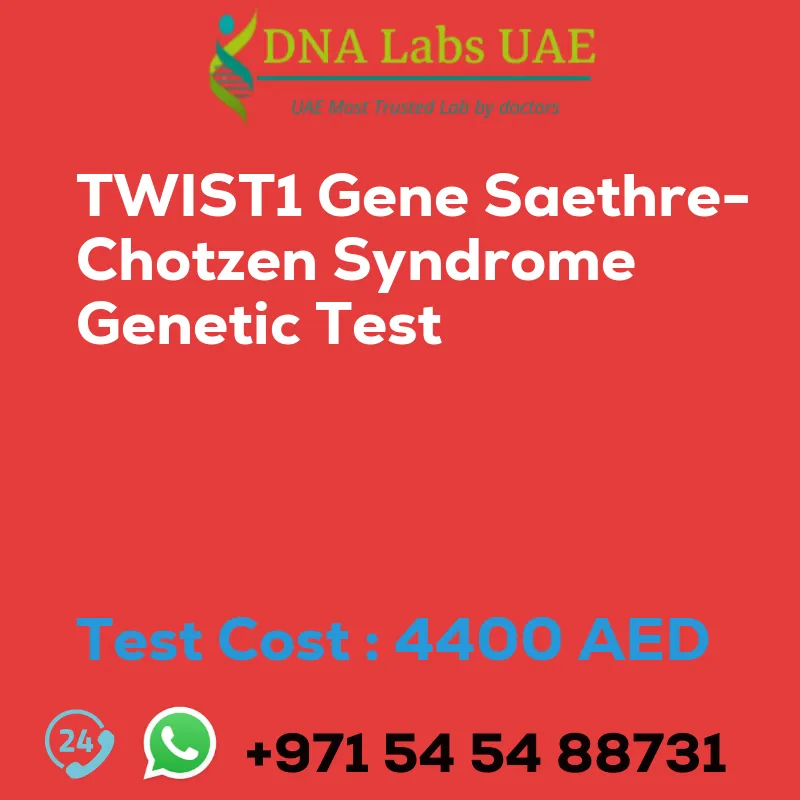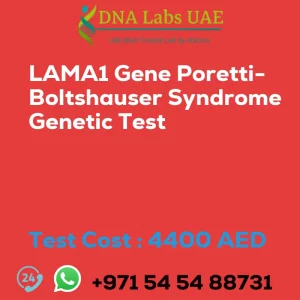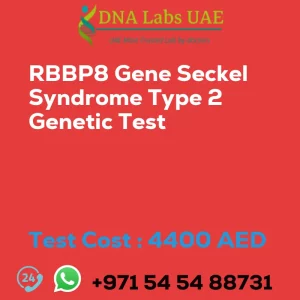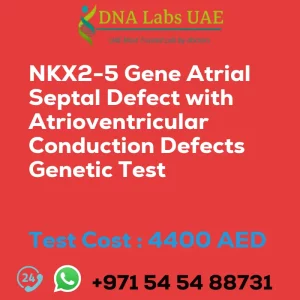Genetic Lab Blog – TWIST1 Gene Saethre-Chotzen syndrome Genetic Test
At DNA Labs UAE, we offer the TWIST1 Gene Saethre-Chotzen syndrome Genetic Test at a cost of AED 4400.0. This test is designed to diagnose Saethre-Chotzen syndrome, a genetic disorder characterized by craniosynostosis, facial abnormalities, and limb anomalies.
Test Details
The TWIST1 gene is responsible for the production of a protein called Twist-related protein 1. Mutations in this gene can cause Saethre-Chotzen syndrome. To identify these mutations, we use NGS (Next-Generation Sequencing) technology, which allows for the simultaneous sequencing of multiple genes or even the entire genome.
For the TWIST1 Gene Saethre-Chotzen syndrome Genetic Test, we require a DNA sample from the individual suspected of having the syndrome. This sample can be obtained through a blood sample, saliva swab, or one drop of blood on an FTA card. The DNA is then sequenced using NGS technology, which reads the DNA sequence and identifies any variations or mutations in the TWIST1 gene.
Test Components and Price
The TWIST1 Gene Saethre-Chotzen syndrome Genetic Test is priced at AED 4400.0. This cost includes the analysis of the DNA sample using NGS technology and the generation of a detailed report.
Report Delivery
After the DNA sample has been analyzed, the report will be delivered within 3 to 4 weeks. This report will provide information on any mutations or variations found in the TWIST1 gene.
Test Type and Department
The TWIST1 Gene Saethre-Chotzen syndrome Genetic Test falls under the category of dysmorphology, which is the study of abnormal physical features or development. This test is conducted in our Genetics department.
Doctor and Pre Test Information
Our TWIST1 Gene Saethre-Chotzen syndrome Genetic Test is conducted by experienced pediatricians specializing in genetics. Before the test, it is important to provide the clinical history of the patient who is going for the test. Additionally, a genetic counseling session will be conducted to draw a pedigree chart of family members affected with TWIST1 Gene Saethre-Chotzen syndrome NGS Genetic DNA Test gene TWIST1.
Benefits of the Test
The TWIST1 Gene Saethre-Chotzen syndrome Genetic Test using NGS technology provides a definitive diagnosis for Saethre-Chotzen syndrome. This diagnosis can help guide treatment and management options for affected individuals. Additionally, the test can be used for genetic counseling and family planning purposes.
| Test Name | TWIST1 Gene Saethre-Chotzen syndrome Genetic Test |
|---|---|
| Components | |
| Price | 4400.0 AED |
| Sample Condition | Blood or Extracted DNA or One drop Blood on FTA Card |
| Report Delivery | 3 to 4 Weeks |
| Method | NGS Technology |
| Test type | Dysmorphology |
| Doctor | Pediatrics |
| Test Department: | Genetics |
| Pre Test Information | Clinical History of Patient who is going for TWIST1 Gene Saethre-Chotzen syndrome NGS Genetic DNA Test. A Genetic Counselling session to draw a pedigree chart of family members affected with TWIST1 Gene Saethre-Chotzen syndrome NGS Genetic DNA Test gene TWIST1 |
| Test Details |
The TWIST1 gene is responsible for the production of a protein called Twist-related protein 1. Mutations in this gene can cause Saethre-Chotzen syndrome, which is a genetic disorder characterized by craniosynostosis (premature fusion of the skull bones), facial abnormalities, and limb anomalies. NGS (Next-Generation Sequencing) genetic testing is a type of genetic test that allows for the simultaneous sequencing of multiple genes or even the entire genome. In the context of Saethre-Chotzen syndrome, NGS genetic testing can be used to identify mutations in the TWIST1 gene. This test involves obtaining a DNA sample, usually through a blood sample or saliva swab, from the individual suspected of having Saethre-Chotzen syndrome. The DNA is then sequenced using NGS technology, which reads the DNA sequence and identifies any variations or mutations in the TWIST1 gene. NGS genetic testing for Saethre-Chotzen syndrome can provide a definitive diagnosis and help guide treatment and management options for affected individuals. It can also be used for genetic counseling and family planning purposes. |








